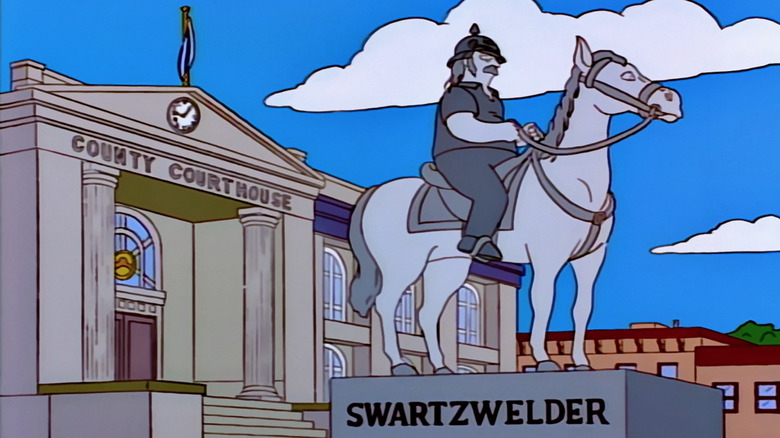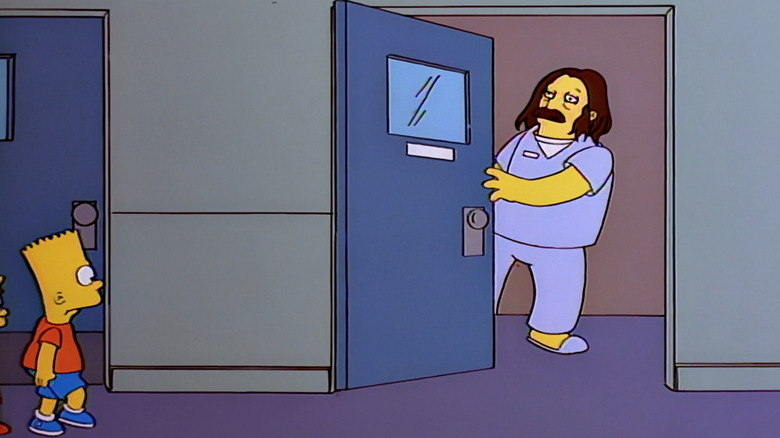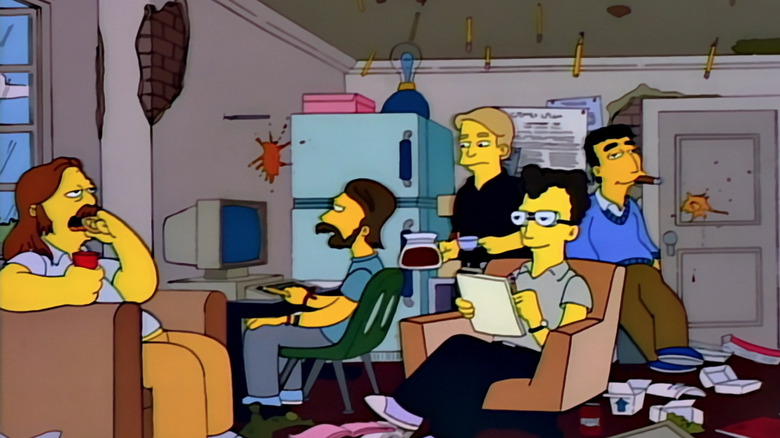Legendary Simpsons Writer John Swartzwelder Thought The Show Was Run In 'A Dangerous Way'
Growing up, I had nothing but disdain for Fox. I had no idea what Fox had done to deserve it, I just knew Fox = bad. That was all thanks to "The Simpsons," which took every opportunity it could to belittle and mock its network. From Homer Simpson investing in NewsCorp only for Lisa to tell him "Dad, that's Fox," prompting Homer to frantically utter "Undo, undo!" to the overzealous Fox censor at the beginning of "Treehouse of Horror VIII" who's stabbed to death by the very TV rating he's bestowed on the episode, "The Simpsons" taught me that Fox was a joke.
But how did the show get away with consistently lambasting its own TV network? It was all down to executive producer James L. Brooks' and a little white lie. Brooks was such a fan of "The Simpsons" creator Matt Groening that he insisted on a clause in the show's contract with Fox that stated the network could not interfere at all. Following that, to quote Homer from Season 4 episode "Mr. Plow:" "It may be on a lousy channel, but the Simpsons are on TV."
Not only were they on TV, they were on TV unimpeded by studio notes. The only thing they had to contend with before putting out episodes was that pesky Fox censor. As former "The Simpsons" co-showrunner Bill Oakley told The Hollywood Reporter, Fox was "not allowed to see the material, [and] not allowed to come to the table reading. They were not allowed to do anything but broadcast the show when we delivered it on videotape." Did that help to preserve the show's high quality? If you ask legendary "The Simpsons" writer John Swartzwelder, it was a "dangerous" way to run things — sort of.
Fox was a 'fledgling joke network'
Part of the reason why Rupert Murdoch's network went along with James L. Brook's demands back in the day is that Fox was a fairly nascent entity at that point. Or, as voice actor Harry Shearer — best known for Mr. Burns — put it in a 2004 interview, "[Fox] was such a fledgling joke network back then." Naturally, the writers had a decades-long field day with their unprecedented freedom. From season to season, "The Simpsons" writers would directly address their "fledgling joke network," never missing a chance to take a shot at the very company that broadcast their satirical musings on American culture.
Among them was John Swartzwelder, a former ad copywriter and Saturday Night Live writer who has gained an almost mythical reputation after working on "The Simpsons" for its first 15 seasons and contributing more episodes than any other writer in the show's history. Contributing to his mysterious and legendary status is the fact that he is famously reclusive — he never once took part in any DVD commentaries or granted interviews. Well, until The New Yorker finally convinced him to do one in 2021.
In it, after revealing that he pursued a career in comedy writing to become a "national treasure," Swartzwelder offered his take on Fox's inability to intervene in the production of "The Simpsons:"
"The executives weren't sent advance copies of the scripts, and they couldn't attend read-throughs, even though they very much wanted to. All we had to do was please ourselves. This is a very dangerous way to run a television show, leaving the artists in charge of the art, but it worked out all right in the end. It rained money on the Fox lot for thirty years. There's a lesson in there somewhere."
They still did try to intervene
While everything worked out well in the case of "The Simpsons," there's no guarantee this "dangerous" approach will always be as successful. From the network executives' perspective, it probably did seem risky, which is likely why there were a couple of instances where Fox tried to intervene — albeit unsuccessfully.
"The Simpsons" made a whole episode about network interference and audience expectations with the 14th episode of its eighth season: "The Itchy & Scratchy & Poochie Show." In The Hollywood Reporter's oral history of the episode, former co-showrunner Josh Weinstein revealed that he and co-showrunner Bill Oakley would actually meet with the network president and Fox executives once a year, "as a courtesy." At one of these meetings, Oakley recalled how "someone suggested that we add another family member to the show, a teenager." That formed the genesis of the "Poochie" character in the aforementioned episode, immortalizing that particularly misguided suggestion in the history of "The Simpsons."
Unfortunately, the ongoing Fox bashing has declined in recent years, with "The Simpsons" preferring to sing Disney's praises these days. And while the latest seasons have been quite good, the show will never be the same irreverent pop culture juggernaut it once was. This means we likely won't see returning Disney CEO Bob Iger depicted as a criminal as we did with Rupert Murdoch, or a fake telethon to "save Disney" and preserve "crude, low-brow programming."
That's a shame — in that it only reminds us how much "The Simpsons" has become like the things it once lampooned. For me, something generally feels off without my regular reminders of Fox's evil, especially since 'national treasure' John Swartzwelder retired from the show to enjoy life truly free of interference.


